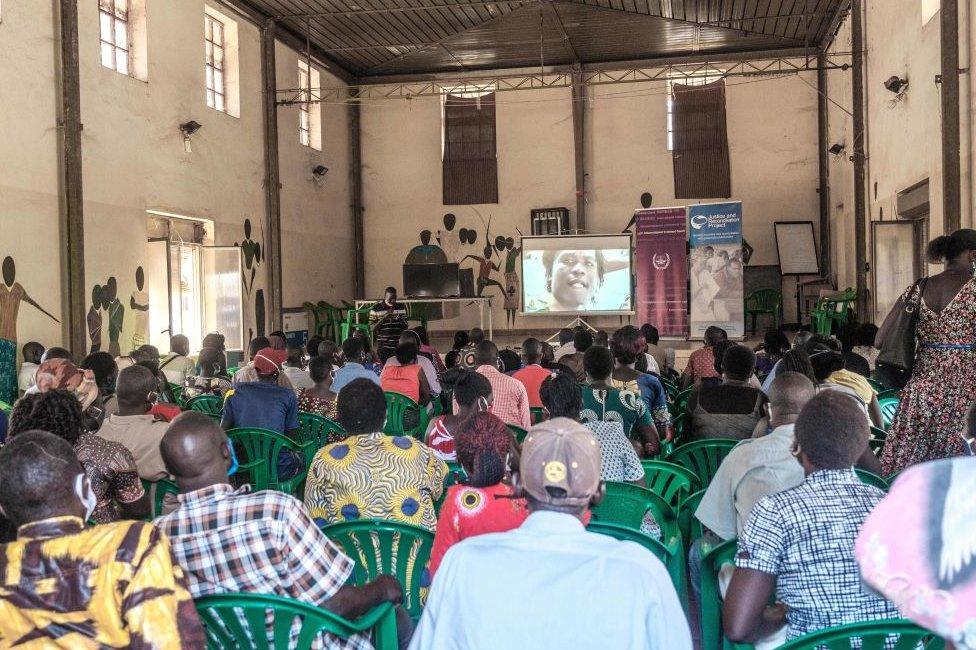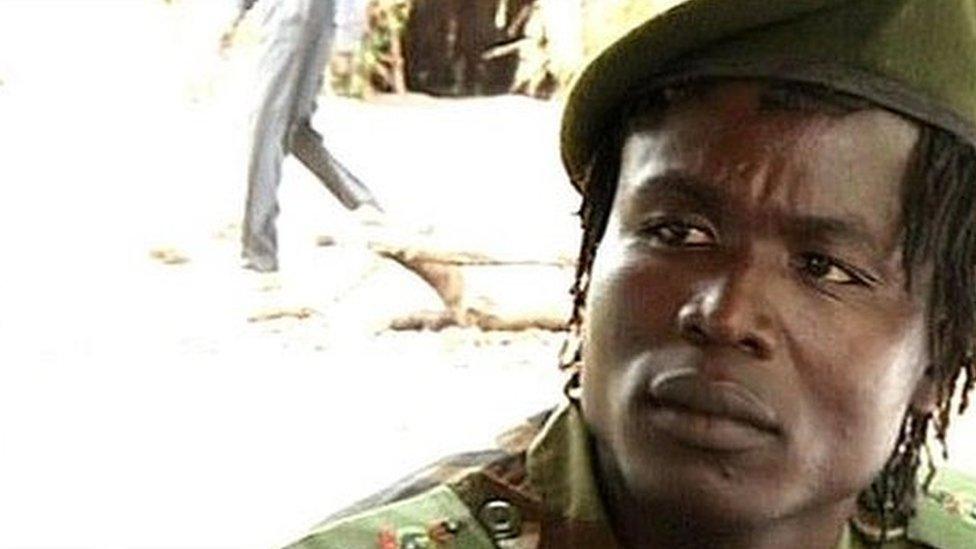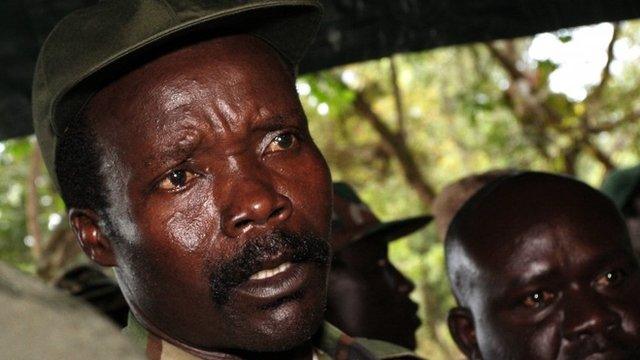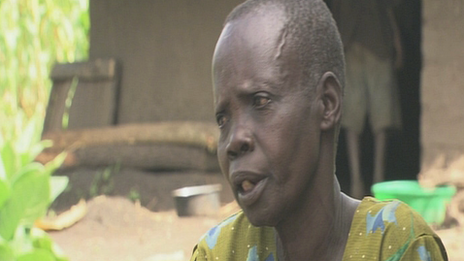Dominic Ongwen convicted of war crimes for Uganda's LRA rebels
- Published

Dominic Ongwen says he was abducted by the LRA and became a child soldier
Ex-Ugandan rebel commander Dominic Ongwen has been convicted of war crimes at the International Criminal Court.
Thursday's historic ruling also saw him convicted of forced pregnancy - a legal first in an international court.
Ongwen, a feared commander of the notorious Lord's Resistance Army (LRA), is the first member of the LRA to appear before the court.
He was convicted on 61 of the 70 counts of crimes against humanity and war crimes he faced.
The charges relate to attacks on four camps for internally displaced people in Uganda in 2004. More than 4,000 victims provided testimony in the ICC case.
Ongwen's sentence is to be handed down at a later date. He could face life imprisonment.
This case presented a dilemma to the court as Ongwen appeared to be both the victim and the alleged perpetrator.
He said he was abducted by the LRA and forced to be a child soldier, before going on to rise up the ranks to become the deputy to LRA commander Joseph Kony.
"Straight away we can say without mincing words that we are definitely going to appeal. On all the charges," Ongwen's lawyer Krispus Ayena Odongo told the BBC. He said the verdict "landed like a bombshell".
But it was welcomed by Elise Keppler, associate director of the International Justice Program at campaign group Human Rights Watch.
"This case is a milestone as the first and only LRA case to reach a verdict anywhere in the world," she told the AFP news agency.

Who is Dominic Ongwen?
Abducted by the LRA on his way to school
Rose to become a top commander
Accused of war crimes and crimes against humanity, including enslavement
ICC issued arrest warrant in 2005
US offered $5m (£3.3m) reward for information leading to his arrest in 2013
Transferred to the ICC in 2015 after his surrender. Found guilty of war crimes in 2021.

What was he convicted of?
Ongwen was convicted of war crimes, crimes against humanity, murder, rape torture, sexual enslavement and pillaging, among others.
The ICC issued a warrant for his arrest in 2005 and US and African forces had been searching for him since 2011.
In 2015 he gave himself up in the Central African Republic (CAR) and his three-and-a-half year trial in the Hague ended in March.
At the start of the trial, according to AFP news agency, prosecutors showed gruesome footage of the scene after an LRA attack on Lukodi refugee camp in northern Uganda, where children were disembowelled and the charred bodies of babies left in shallow graves.

Thursday's ruling in The Hague was watched live by people in Gulu - not far from the Lukodi refugee camp
Presiding Judge Schmitt read out the names of civilians who were murdered on the orders of Ongwen at that same refugee camp and three others in the areas of Pajule, Odek, and Abok.
"Civilians were shot, burned and beaten to death. Children were thrown into burning houses, some were put in a polythene bag and beaten to death," the judge is quoted as saying.
In a legal first for an international criminal court, Ongwen was convicted of the crime of forced pregnancy committed against seven women.
What did the judge say?
Reading out his verdict at the end of Ongwen's trial, presiding judge Bertram Schmitt said "the chamber is aware that he suffered much.
"However this case is about crimes committed by Dominic Ongwen as a responsible adult and a commander of the Lord's Resistance Army.
Judge Schmitt added: "His guilt has been established beyond any reasonable doubt.
He said there was no evidence to support the defence argument that Dominic Ongwen "suffered from any mental disease or disorder during the period relevant to the charges, or that he committed these crimes under duress".

What do LRA victims think of the verdict?
By Patience Atuhaire, BBC News, Gulu, northern Uganda
I spoke to three women gathered here to watch the verdict being delivered, all former abductees.
"I was not satisfied because some of the LRA commanders came home and were given amnesty and they're living normal lives. So why is Ongwen the only one being tried?" said one.
"I'm opposed to the court's decision of finding him guilty of those crimes. The court should have acknowledged that he handed himself over, he wasn't captured," said another.
The third one said: "I was abducted like Ongwen too, but he was a commander in the LRA, so he should be given the maximum sentence, considering what they did to me and lots of children from this region. The ruling today has touched me very much."
She shed tears, and her voice broke, as she described what happened to her.
"When I was taken in 1996, I was two months' pregnant. We walked for hours between the border with Uganda and Sudan. Along the way, the rebels asked if any of us had an issue that meant we couldn't continue on the journey. I put my hand up.
"The commander asked the young soldiers to beat us with sticks. They said they would have to kill one of us that day, to discourage the young ones from trying to escape. They beat me all over the stomach and chest."
She managed to escape after just a week in the bush.

Who are the LRA?
The LRA was formed in Uganda where it said its goal was to install a government based on the biblical 10 commandments.


Led by Joseph Kony, it became notorious for abducting thousands of children to use as soldiers or sex slaves, while rebel fighters would hack off their civilians' limbs or parts of their faces.
In 2005, the LRA was forced out of Uganda by the army and the rebels went into what was is now South Sudan and eventually set up camp in the border area with the Democratic Republic of Congo.
They later moved to CAR where they acted more like a criminal outfit engaging in poaching and illegal mining.
- Published6 May 2021

- Published24 November 2014

- Published20 August 2012
